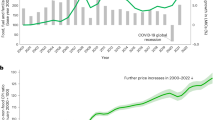Abstract
Nineteenth-century classical economist Thomas Malthus predicted a bleak future for mankind because of his argument that population growth had a natural tendency to outpace growth in food supplies. Interest in the ideas of Malthus was reawakened by the explosion in international food prices during the 1970s—the ‘World Food Crisis’—but this quickly subsided when prices fell and we entered an era of ‘cheap food’. However, international food prices exploded again in 2008 and since then have remained relatively high and volatile. This time, the cause may have been a major shift in the long term balance between supply and demand for food on world markets. Although most experts predict a gradual decline in the rate of growth in the world’s population, this still means many more mouths to feed by the end of the century. In principle, there can be enough food, but more enlightened international policies will be required if global inequality does not lead to a Malthusian future.
Access this chapter
Tax calculation will be finalised at checkout
Purchases are for personal use only
Similar content being viewed by others
References
Boserup, E. (1981). Population and technology. Oxford: Basil Blackwell.
Brown, L. (2012). Full planet, empty plates: The new geopolitics of food security. New York: W.W. Norton.
Devereux, S. (2001). Sen’s entitlement approach: Critiques and counter-critiques. Oxford Development Studies, 29(3), 245–263.
Malthus, T. (1803). An essay on the principle of population. London: Johnson.
Meadows, D. H., Meadows, D., Randers, J., & Behrens, W. W. (1972). The limits to growth. London: Pan Books.
Morgan, D. (1979). Merchants of grain. New York: Viking.
Ritson, C. (2016). The concept of food security and the future of world food prices. Discussion paper 37, Centre for Rural Economy, Newcastle University.
Sen, A. K. (1981). Poverty and famines. Oxford: Clarendon Press.
Acknowledgement
I would like to thank Francis Naab for his help in constructing the diagrams.
Author information
Authors and Affiliations
Corresponding author
Editor information
Editors and Affiliations
Rights and permissions
Copyright information
© 2020 Springer Nature Switzerland AG
About this chapter
Cite this chapter
Ritson, C. (2020). Population Growth and Global Food Supplies. In: Rutland, M., Turner, A. (eds) Food Education and Food Technology in School Curricula. Contemporary Issues in Technology Education. Springer, Cham. https://doi.org/10.1007/978-3-030-39339-7_17
Download citation
DOI: https://doi.org/10.1007/978-3-030-39339-7_17
Published:
Publisher Name: Springer, Cham
Print ISBN: 978-3-030-39338-0
Online ISBN: 978-3-030-39339-7
eBook Packages: EducationEducation (R0)




